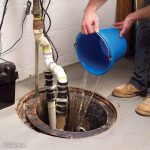 If you’re like most Western New York homeowners, you probably don’t think about your sump pump as it’s quietly doing its job. But you will notice, however, when your sump pump malfunctions or becomes overwhelmed and your basement turns into a flood zone. The risk of malfunction or overwhelm is at its highest every late winter and early spring, yet there are a number of steps you can take to be prepared.
If you’re like most Western New York homeowners, you probably don’t think about your sump pump as it’s quietly doing its job. But you will notice, however, when your sump pump malfunctions or becomes overwhelmed and your basement turns into a flood zone. The risk of malfunction or overwhelm is at its highest every late winter and early spring, yet there are a number of steps you can take to be prepared.
Sump Pump Operation
The job of a sump pump is to collect ground water in a basin, also called a pit or crock. When the ground water levels in the sump pit reaches a certain level, the float in the pit activates a switch that turns on the sump pump motor. The motor siphons water from the pit, pushing it out of the basement and away from your home.
‘Sump Season’ Risk
Late winter and early spring is known as “sump season.” Temperature fluctuations and thawing in the Buffalo area can lead to excessive ground water and pooling, which puts your sump pump at a high risk of malfunctioning or becoming overwhelmed. The result is often a flooded basement, which carries an average water damage insurance claim of nearly $7,000.
Sump Pump Maintenance
Properly maintaining your sump pump is one way to reduce the risk of malfunction or overwhelm, and sump season is a prime time to perform it. Western New York sump pump maintenance tips include:
- Removing the cover and checking the sump pit for accumulated debris.
- Flushing out the system. Fill the sump pit with water from a hose or bucket, ensuring the pump runs smoothly once it turns on.
- Examining the float to make sure it travels freely up the rod to activate the pump switch.
- Checking the sump pump’s discharge pipe on the exterior of your home, ensuring it’s free of debris and sends water flowing away from your home’s foundation.
Sump Pump Disaster-Prevention Tips
Even a well-maintained sump pump can become overwhelmed during sump season when water levels simply get too high for it to handle. Two disaster-prevention tips can help ensure your basement doesn’t end up flooded.
- Water alarms: Sump pump water alarms alert you if your basement water level is rising too rapidly for the pump to keep up, signaling you to take immediate action. Water alarms come in a variety of different types, with functions that range from straightforward high-water alerts to alerts concerning potential threats throughout your entire home.
- Backup sump pumps: Backup sump pumps can supplement your primary sump pump when the load gets too heavy. Choose a backup sump pump that runs on batteries, and it can also kick in during a power outage if needed. Most battery backup sump pumps provide several hours of added protection for your Buffalo-area basement.
As a leading home inspection company in Western New York, we’ve seen the damage floodwater can do to basements and home foundations. With these sump pump maintenance and disaster-prevention tips, you can reduce the risk to your own home during sump season and all year long.


